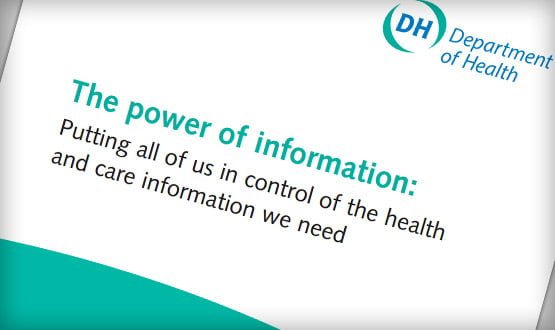Joe’s view: of The Power of Information
- 26 June 2012

Last month, I talked about rating clinical systems and threw down a challenge to suppliers to submit themselves to the www.comparethesoftware.co.uk test.
I was encouraged by the number of people who went to the dummy website and attempted to rate the usability of software, and I’ve been invited to take part in some interesting conversations. Watch this space.
Everything I know about the usability of electronic patient records was taught to me by the Department of Health’s excellent user interface expert Stephen Corbett during my time at NHS Connecting for Health.
I wonder what will happen to the expertise people like Stephen have gleaned from the painful learning process that was the National Programme for IT in the NHS.
Will it be scattered to the four winds with the dismantling of CfH, or will we retain it in order to avoid repeating history? Does the new NHS information strategy have the answer?
The information strategy
Hardly anybody seems to call the strategy by its proper name, the ‘Power of Information’, never mind its subtitle, ‘putting us all in control of the health and social care information we need’. But then, I wonder how many people have read the whole thing.
I did. For those who can’t be bothered there’s a good summary in the BMJ, published on 9 June, and, of course, EHI has published a number of stories and reaction pieces about it.
It is hard to argue with most of it, but it is the product of a long process of consultation. Consequently, it is longer and less inspiring than Martin Luther King’s “I have a dream” speech, which changed the world with five sides of A4.
The word “usability” sadly does not feature in the document, although it was certainly a topic which regularly came up during the consultation.
In my experience there are always three tribes fighting for the soul of an electronic patient record system; the clinicians, the managers; and the IT crowd. If the clinicians don’t win that struggle, the EPR will fail (I’ve called this, rather pompously, McDonald’s Law).
Show me the money
For those in the North Midlands and East who have got nothing from NPfIT I could find little comfort other than these two paragraphs:-
6.9: Many trusts have or will have patient administration systems from the national programme. For those that have not been able to secure patient administration systems from the national programme capital funds will be available in the usual way for investment in IT from the Department of Health.
6.10: In moving to a more locally driven model for delivering informatics, the Department of Health recognises the need for central funding to be made available to the local NHS. A capital fund is being developed that will initially cover 2013-14 and 2014-15 to achieve this. The detail of how this can be best made to work will be developed over the summer/autumn of 2012.
Hmmmmmm… But then, the strategy is unashamedly short on detail because of an aversion to a prescriptive, top down approach that we all understand but is strangely unexplained in the document itself.
I was left feeling slightly uninspired and that an opportunity had been missed. But it’s easy to be critical and I see the 30 comments on EHI’s own view of the strategy are largely criticisms. So rather than add to that, I thought I’d have a go at writing my own, much shorter version.
Joe’s Information Strategy
Title: Building on success , learning from failure
Span: Five years
Objective: Achieve global domination in the health IT market for the UK
How?
Step 1: Rapid review of NPfIT and production of an independent Lessons Learned report; however embarrassing.
Step 2: Seek sponsorship funding for the development of an authoritative, clinically led, standard setting authority.
Step 3: Establish an online NHS trust to pilot an online health service for the use of consenting adults who are computer literate, at least to the point at which they are happy to use Skype for video consultations.
Step 4: Create an open market for health IT underpinned by the publication of usability data and reviews allowing customers to have a real and well-informed choice of supplier.
Err…. That’s it.
The details
Step 1: In terms of an independent review and lessons learned this could be commissioned by the DH from an independent provider, such as the British Computer Society.
Maybe Richard Bacon MP could be persuaded to chair. Those who fail to learn from history are doomed to repeat it.
Bits of NPfIT that need to go forward (the Electronic Prescription Service, no brainer, NHSmail, if the ludicrously small inbox can be enlarged and so forth) could be identified.
Bits of dubious worth (Choose and Book) could maybe be made to deliver real value. Choose and Book for example has the ability (currently unused) to link an individual consultant to an outside website like www.iwantgreatcare.com.
If we used it, we could give patients the chance to choose on quality of care, as judged by other patients, rather than on distance to hospital. Hey Presto! Instant TripAdvisor for health at zero additional cost.
Other programmes (HealthSpace) could be culled to fund other developments, while a few more (NHS Choices) could potentially fund or partially fund themselves through advertising, given their footfall.
Step 2: A standard setting authority? Well, medicine has regularly thrown up a new “ology” – radiology, microbiology and so on. So we have several road maps showing how to transit a new “ology” from cottage industry to national standards, and the establishment of a Royal College of Health Informatics could be the way ahead.
In order to have the necessary authority, the new college would need a large amount of cash. Perhaps we could seek the support of Bill Gates or Mark Zuckerberg? Maybe suppliers could help.
Step 3: The establishment of St Skype’s online hospital for the early adopters of technology would benefit the wider population in time.
The argument that we cannot do something because “some people will be excluded” is the argument for cancelling the Wright Brother’s first flight until cheap air travel for all is available.
Step 4: Finally, the suppliers of health IT need to embrace the openness and transparency that I face as a doctor through comparison websites.
The Royal College of Health Informatics
Whatever the strategy, we are likely to make sub-optimal progress without the inspired and inspiring leadership required to bring about a cultural shift.
Our leader will need all the trappings of authority; swanky offices in central London, large oak-panelled hall lined with portraits of the former presidents of the Royal College of Health Informatics, oh, and a title. Arise Sir Tim Kelsey?
Competition
So that’s my brief information strategy, how about yours? Please send me your brief information strategy, less than 100 words.
A prize of one pint of reasonably priced beer and a packet of pork scratchings at The National Mental Health Informatics Network’s favourite pub, “The Parcel Yard” at King’s Cross, will be awarded to the best effort.
About the author: Joe McDonald is a practising NHS consultant psychiatrist. Over the past five years he has been an NHS trust medical director and national clinical lead for IT at NHS Connecting for Health – a stint that included 18 months as medical director of the Lorenzo delivery team!
His experiences in the National Programme for IT in the NHS have left him with a passion for usability and "end user knowledge networks.” He is the founding chairman of the National Mental Health Informatics Network. Motto: we don’t get fooled again. Follow him on twitter @CompareSoftware




